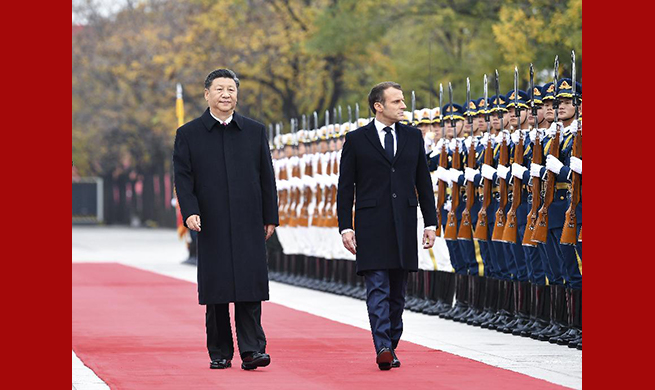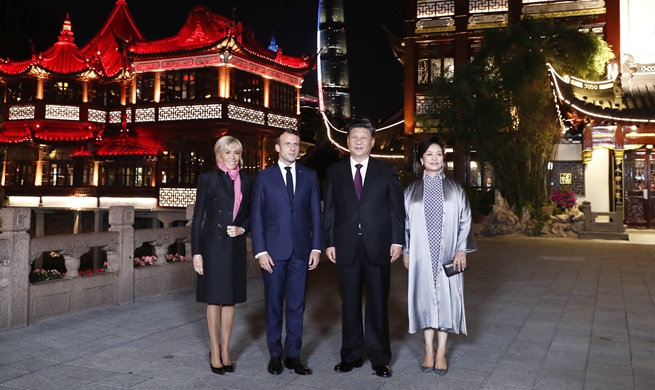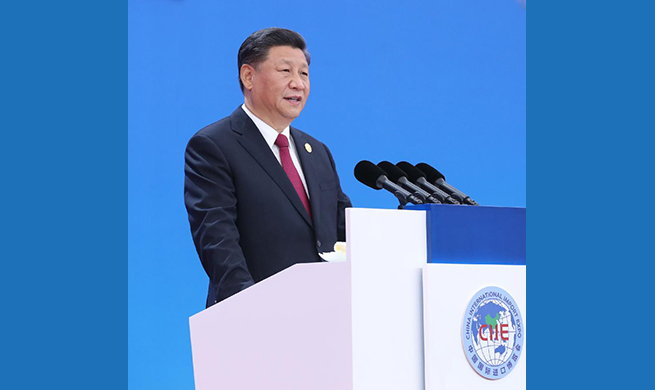UNITED NATIONS, Nov. 6 (Xinhua) -- The United Nations General Assembly (UNGA) on Wednesday heard once again overwhelming calls for lifting the decades-long U.S. embargo on Cuba, a day before voting on a draft resolution seeking an end to the blockade.
Dozens of UN member states as well as international groups made the appeals at the UNGA's yearly plenary meeting on the "necessity of ending the economic, commercial and financial embargo imposed by the United States of America against Cuba."
The delegation from Grenada, delivering remarks on behalf of the Caribbean Community (CARICOM), a bloc of developing countries, said the embargo is an anachronism and an aberration in today's world, as it serves no useful purpose today when global cooperation is so critical to addressing current challenges.
It added CARICOM views the embargo not just as a punitive act against Cuba, but as an impediment to Caribbean regional development as a whole.
The delegation from Singapore, speaking on behalf of the ten members of the Association of Southeast Asian Nations (ASEAN), said differences between states should be resolved on the basis of the fundamental principle of sovereign equality, non-interference, and non-intervention.
ASEAN encourages the United States and Cuba to renew their commitment to an open and constructive dialogue, underpinned by mutual respect, it urged.
The Palestinian delegation, on behalf of the Group of 77 and China, said if these economic sanctions continue, Cuba's development potential in both economic and human development terms will be unfairly undermined, and it would be impossible for Cuba to successfully embark on the path towards sustainable development.
The delegation, representing the largest bloc of developing countries among UN member states, appealed to the international community to further step up efforts in supporting the lifting of the embargo, not only for the sake of Cuba alone, but also for the fair achievement of economic and social development of all members of the global community as a whole.
Zhang Jun, China's permanent representative to the United Nations, voiced hope that the United States will abolish its embargo policy against Cuba as soon as possible, noting that from April 2018 to March 2019 alone, the embargo cost Cuba 2 billion U.S. dollars in foreign trade losses as well as over 700 million dollars of financial assets.
He stressed peace, development cooperation and win-win relations have become the motive of our times and the general trend of globalization is unstoppable. "Dialogue as equals and friendly consultation are the best ways to resolve differences. Unilateralism, protectionism and bullying will eventually harm those who perform such acts."
In this context, he said both the United States and Cuba should move "with the historical trend of our times" through developing normal interstate relations, which serves the common interests of the two countries and their people, and promote peace and stability throughout the Americas.
Russian Deputy Foreign Minister Alexander Pankin said, "Russia has always stood in solidarity with the fraternal people of Cuba in surmounting the difficulties that have arisen as a consequence of Washington sanctions."
He pointed out that the U.S. blockade has already caused a loss of more than 922 billion U.S. dollars in economic damage to Cuba while obstructing the Cuban citizens' right to a dignified life and embracing their own socio-economic development.
On Thursday, UN member states will proceed with the vote on the draft resolution that Cuba submits every year, seeking to end the U.S.-imposed blockade.
Dozens of nations said in their speeches Wednesday that they will vote in favor of the draft resolution, whose predecessors have been adopted by an overwhelming majority over the past 27 consecutive years.
Despite the political weight they carry, the UNGA resolutions are not legally-binding and thus their implementation cannot be enforced.
Some media reports have quoted Cuban Foreign Minister Bruno Rodriguez as saying the United States had exerted pressure on Latin American countries to oppose the draft resolution.
U.S.-Cuban relations deteriorated after U.S. President Donald Trump assumed office in 2017. Since then, the U.S. administration has partially rolled back the detente initiated by former U.S. President Barack Obama and reverted to Cold War rhetoric, while maintaining re-established diplomatic ties.

















